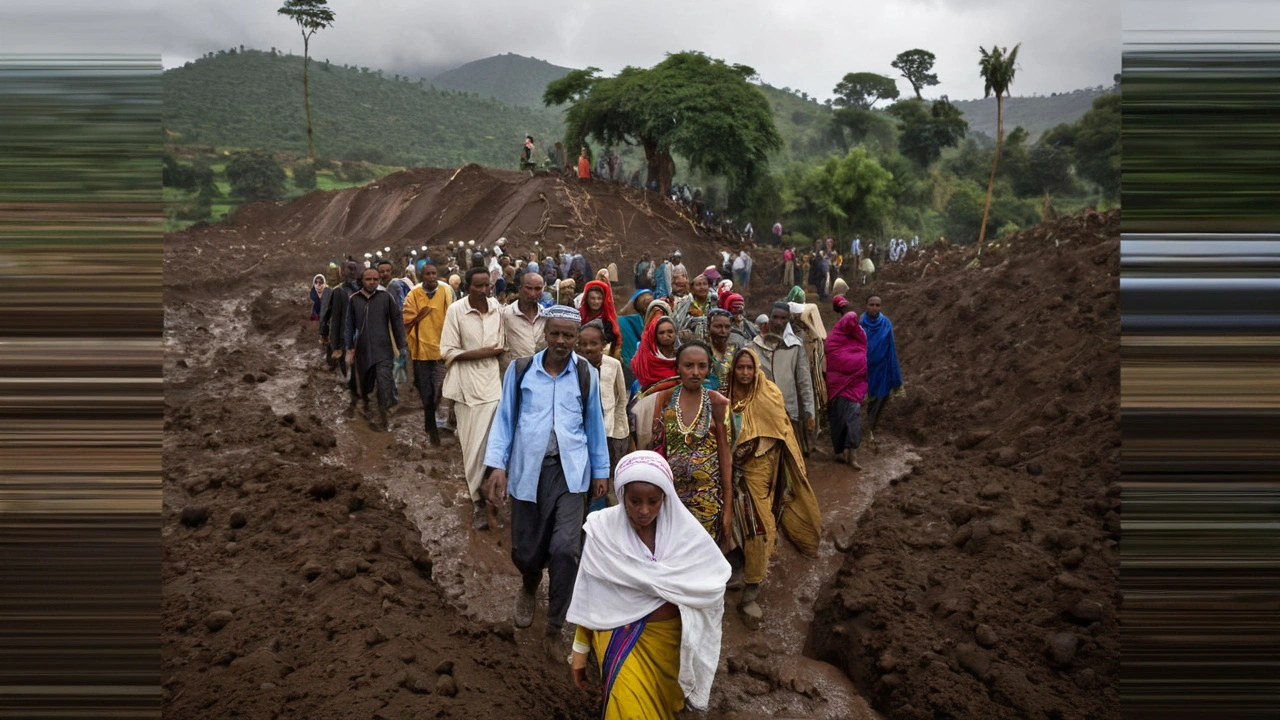Ethiopia Declares National Mourning After Landslide Tragedy
On Friday, Ethiopia announced a three-day period of national mourning to honor and remember the lives lost in a tragic landslide that struck the remote southern region of the country. The devastating event occurred after days of heavy rainfall, which triggered the landslide, resulting in catastrophic loss of life and severe damage to the area.
The United Nations Office for the Coordination of Humanitarian Affairs (OCHA) has reported 257 confirmed fatalities. However, projections suggest that the death toll may escalate to as many as 500 individuals. As the nation grapples with the magnitude of this disaster, the mourning period, commencing on Saturday, is aimed at offering a sense of solace and solidarity to the grieving families and the nation at large.
Immediate Impact and Rescue Efforts
The Ethiopian Disaster Risk Management Commission has sprung into action, with rescue and humanitarian aid efforts already underway. Approximately 6,000 individuals are in urgent need of relocation, with over 15,000 requiring evacuation due to the persistent risk of further landslides in the region. The immediate concern remains the safety and well-being of those affected, and both local and international agencies are working tirelessly to provide necessary aid.

Humanitarian Assistance and Relocation
Efforts to assist the affected communities are being coordinated at both the national and international levels. The Ethiopian Red Cross Society has begun dispatching aid shipments to the affected zones, focusing on providing essential supplies and support to those displaced by the landslide. The scale of the disaster has prompted a broad international response, with organizations and nations sending condolences and pledging assistance.
International Condolences and Support
Messages of sympathy and support have flowed in from across the globe. Key figures such as African Union representatives, United Nations Secretary-General Antonio Guterres, and World Health Organization Director-General Tedros Adhanom Ghebreyesus have expressed their condolences and offered support for Ethiopia during this dire time. The international community's response highlights the global solidarity in the face of such a calamity and the collective effort to provide relief and aid to the affected areas.
Ongoing Challenges and Ethiopia's Vulnerability
This tragic event starkly underscores Ethiopia's susceptibility to climate-induced natural disasters. The nation has been grappling with a range of climatic adversities, including conflict, flooding, and drought. Over 21 million people in Ethiopia currently rely on humanitarian aid due to these compounding factors. The landslide has brought to the forefront the critical need for enhanced disaster preparedness, response mechanisms, and infrastructure resilience.
The Ethiopian government, along with various stakeholders, is evaluating long-term strategies to mitigate the impacts of future disasters. Investing in resilient infrastructure, improving early warning systems, and enhancing community preparedness are among the measures being considered. The urgency of these initiatives is pronounced by the recurring nature of such climatic events and their devastating impacts on communities.

The Road Ahead: Rebuilding and Recovery
As Ethiopia embarks on the path to recovery, the focus will be on rebuilding affected areas and supporting displaced populations. The government and humanitarian agencies are prioritizing the provision of temporary shelters, healthcare services, and psychological support for those affected by the landslide. Ensuring that children continue to have access to education and restoring livelihoods will be critical components of the recovery plan.
The collaborative efforts of local communities, the Ethiopian government, and international organizations will be pivotal in overcoming the immediate and long-term challenges posed by the disaster. The resilience and solidarity displayed by Ethiopians during this period of mourning and rebuilding serve as a testament to the strength and unity of the nation.
Conclusion
The landslide tragedy in Ethiopia has left an indelible mark on the nation. As the country observes three days of national mourning, the collective grief is accompanied by a resolve to support those affected and rebuild from this calamity. The concerted efforts of humanitarian aid, government action, and international support underscore a shared commitment to aiding the recovery process and enhancing the nation's resilience to future natural disasters.


And yeah, climate change is the elephant in the room - but so is decades of underinvestment in rural infrastructure. We don’t need to blame them. We need to show up.
Let us not confuse grief with governance.
These women saved 17 lives last year. They’re not waiting for someone to save them. They’re saving each other. Maybe we should listen to them before the next disaster hits.
We memorialize the dead, but we optimize the supply chains of their suffering. The Red Cross gets funding. The engineers don’t. The condolence statements get tweeted. The early-warning sensors rust in warehouses.
This isn’t about Ethiopia. It’s about how the Global North turns grief into content and then forgets.